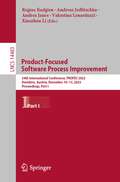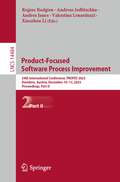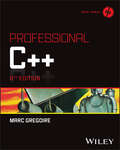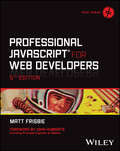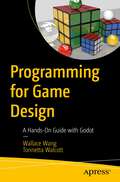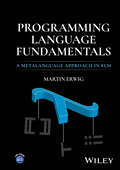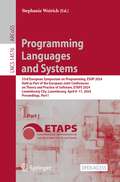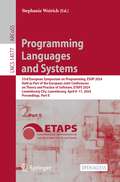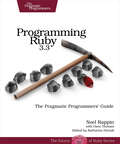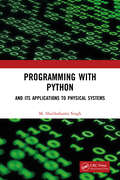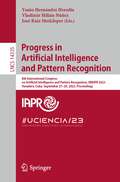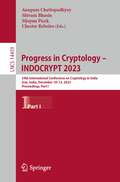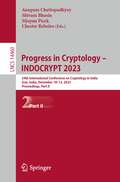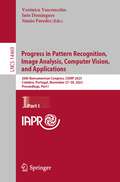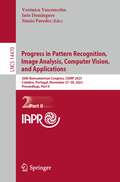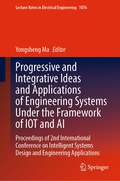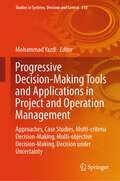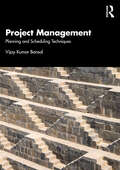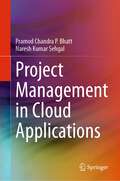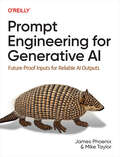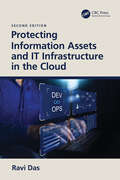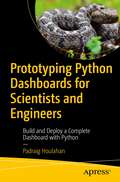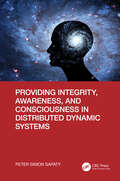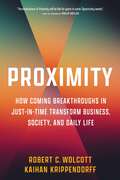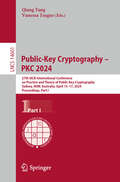- Table View
- List View
Product-Focused Software Process Improvement: 24th International Conference, PROFES 2023, Dornbirn, Austria, December 10–13, 2023, Proceedings, Part I (Lecture Notes in Computer Science #14483)
by Regine Kadgien Andreas Jedlitschka Andrea Janes Valentina Lenarduzzi Xiaozhou LiThis book constitutes the refereed proceedings of the 24th International Conference on Product-Focused Software Process Improvement, PROFES 2023, which took place in Dornbirn, Austria, in December 2023. The 21 full technical papers, 8 short papers, and 1 poster paper presented in this volume were carefully reviewed and selected from 82 submissions. The book also contains one tutorial paper, 12 and workshop papers and 3 doctoral symposium papers.The contributions were organized in topical sections as follows: Part I: Software development and project management; machine learning and data science; software analysis and tools; software testing and quality assurance; security, vulnerabilities, and human factors; Part II: Posters; Tutorials; 2nd Workshop on Computational Intelligence and Software Engineering (CISE 2023); 2nd Workshop on Engineering Processes and Practices for Quantum Software (PPQS’ 23); doctoral symposium.
Product-Focused Software Process Improvement: 24th International Conference, PROFES 2023, Dornbirn, Austria, December 10–13, 2023, Proceedings, Part II (Lecture Notes in Computer Science #14484)
by Regine Kadgien Andreas Jedlitschka Andrea Janes Valentina Lenarduzzi Xiaozhou LiThis book constitutes the refereed proceedings of the 24th International Conference on Product-Focused Software Process Improvement, PROFES 2023, which took place in Dornbirn, Austria, in December 2023. The 21 full technical papers, 6 industrial papers, 8 short papers and 1 poster paper were carefully reviewed and selected from 82 submissions. The book also contains one tutorial paper, 11 workshop papers and 3 doctoral symposium papers. The contributions were organized in topical sections as follows: Part I: Software development and project management; machine learning and data science; software analysis and tools; software testing and quality assurance; security, vulnerabilities, and human factors; Part II: Posters; Tutorials; 2nd Workshop on Computational Intelligence and Software Engineering (CISE 2023); 2nd Workshop on Engineering Processes and Practices for Quantum Software (PPQS’ 23); doctoral symposium.
Professional C++ (Tech Today)
by Marc GregoireExpand your C++ toolkit quickly and efficiently with this advanced resource In the newly revised sixth edition of Professional C++, veteran software engineer and developer Marc Gregoire delivers yet another volume that raises the bar for advanced programming manuals. Covering the major new revisions contained in the new C++ standard codenamed C++23, the book offers case studies with working code that’s been tested in Windows and Linux. The leading resource for dedicated and knowledgeable professionals seeking to advance their C++ skills, this book provides resources that help readers: Maximize C++ capabilities with effective design solutions Master little-known elements and learn what practices to avoid Adopt new workarounds and testing/debugging best practices Use real-world program segments in your own applicationsC++ is a complex and unforgiving language. Professional C++, 6th Edition, allows dedicated practitioners to remain current and abreast of the latest developments and advances.
Professional JavaScript for Web Developers
by Matt FrisbieUpdate and upgrade your JavaScript skillset for ES 2023 with the ultimate JavaScript guide for pros Professional JavaScript for Web Developers, 5th edition, is the gold-standard in intermediate-to-advanced JavaScript programming development books. The author dives directly into the inner workings of JavaScript to help you clean up your code and become a more sophisticated and talented JavaScript developer. From object-oriented programming and inheritance to combining JavaScript with HTML and other markup languages, expert computer engineer Matt Frisbie walks you through everything you need to know to level-up your JavaScript game. This new edition is updated to include ECMAScript 2023 and later standard releases, the most useful techniques, and a relentless focus on code that works seamlessly in mobile web browsers and with the latest common frameworks and libraries. With this book, you will: Get up to date with ECMAScript 2023 Get acquainted with the newest frameworks and libraries Explore advanced topics such as web animation, workers, and the latest APIs Get a head start on future ES releases Learn to use modern syntax and best practices Understand how to optimize performance in JavaScript applications Master asynchronous programming patterns using promises, generators, and async/awaitPerfect for those who think they already know JavaScript “pretty well,” Professional JavaScript for Web Developers, 5th edition, is the pro-level update that intermediate and advanced web developers have been waiting for.
Programming for Game Design: A Hands-On Guide with Godot
by Wallace Wang Tonnetta WalcottCreate video game elements using the Godot game engine, gaining practical experience in programming and video game development. The Godot game engine uses a simplified programming language called GDScript, which closely resembles Python. By learning GDScript, you can focus more on learning the basics of programming. You’ll explore concepts such as variables and data structures variables used to store information about video game objects that can be manipulated using a keyboard or a mouse. You’ll also learn about user interface design, branching statements, and looping statements, enabling you to actively engage in programming and create your own interactive games. By the end of the book, you’ll have a solid understanding of how video game elements work and how the basic principles of programming work as well. By programming simple video game elements in the Godot game engine, you’ll learn both programming and the principles of 2D video game design.What You Will LearnUnderstand the basics of programming by creating simple video game elements in the Godot game engine.Explore variables and data structures to actively store and modify information about video game objects.Gain a deeper understanding of user interface design.Master simplified programming languages like GDScript.Who This Book Is For Aspiring programmers and game enthusiasts seeking an engaging introduction to programming through video game creation.
Programming Language Fundamentals: A Metalanguage Approach in Elm
by Martin ErwigPROGRAMMING LANGUAGE FUNDAMENTALS Understand the key principles of programming languages Programming languages are the tools needed to let algorithms run on electronic computers. As they form the linguistic interface between humans and machines, the understanding of programming languages is essential for being able to control machine behavior. Programming Language Fundamentals offers a precise, comprehensive introduction to the principles that are the basis of most programming languages. Explaining both functional programming and logic programming, it presents a broad perspective on programming and constitutes an indispensable introduction to the foundations of programming languages. Programming Language Fundamentals readers will also find: Introduction to Elm as a metalanguage to encourage thinking and experimenting with programming languages in a formal way Detailed discussion of topics including abstract syntax, semantics, types, and more In-depth explanations of key concepts such as scope and parameter passing Programming Language Fundamentals is ideal for undergraduate students in computer science, as well as researchers and practitioners working with programming languages who are looking to broaden their understanding of the field.
Programming Languages and Systems: 33rd European Symposium on Programming, ESOP 2024, Held as Part of the European Joint Conferences on Theory and Practice of Software, ETAPS 2024, Luxembourg City, Luxembourg, April 6–11, 2024, Proceedings, Part I (Lecture Notes in Computer Science #14576)
by Stephanie WeirichThe two-volume open access book set LNCS 14576 + 14577 constitutes the proceedings of the 33rd European Symposium on Programming, ESOP 2024, which was held during April 6-11, 2024, in Luxemburg, as part of the European Joint Conferences on Theory and Practice of Software, ETAPS 2024.The 25 full papers and 1 fresh perspective paper presented in these proceedings were carefully reviewed and selected from 72 submissions. The papers were organized in topical sections as follows:Part I: Effects and modal types; bidirectional typing and session types; dependent types; Part II: Quantum programming and domain-specific languages; verification; program analysis; abstract interpretation.
Programming Languages and Systems: 33rd European Symposium on Programming, ESOP 2024, Held as Part of the European Joint Conferences on Theory and Practice of Software, ETAPS 2024, Luxembourg City, Luxembourg, April 6–11, 2024, Proceedings, Part II (Lecture Notes in Computer Science #14577)
by Stephanie WeirichThe two-volume open access book set LNCS 14576 + 14577 constitutes the proceedings of the 33rd European Symposium on Programming, ESOP 2024, which was held during April 6-11, 2024, in Luxemburg, as part of the European Joint Conferences on Theory and Practice of Software, ETAPS 2024.The 25 full papers and 1 fresh perspective paper presented in these proceedings were carefully reviewed and selected from 72 submissions. The papers were organized in topical sections as follows:Part I: Effects and modal types; bidirectional typing and session types; dependent types; Part II: Quantum programming and domain-specific languages; verification; program analysis; abstract interpretation.
Programming Ruby 3.3
by Noel Rappin Dave ThomasRuby is one of the most important programming languages in use for web development. It powers the Rails framework, which is the backing of some of the most important sites on the web. The Pickaxe Book, named for the tool on the cover, is the definitive reference on Ruby, a highly-regarded, fully object-oriented programming language. This updated edition is a comprehensive reference on the language itself, with a tutorial on the most important features of Ruby - including pattern matching and Ractors - and describes the language through Ruby 3.3. Would you like to go from first idea to working code much, much faster? Do you currently spend more time satisfying the compiler instead of your clients or end users? Are you frustrated with demanding languages that seem to get in your way instead of helping you get the work done? Are you using Rails and want to dig deeper into the underlying Ruby language? If so, then we've got a language and book for you! Ruby is a fully object-oriented language. The combination of the power of a pure object-oriented language with the convenience of a scripting language makes Ruby a favorite tool of programmers that want to get things done quickly and cleanly. This comprehensive reference manual for Ruby includes a description of the most important standard library modules, built-in classes, and modules. It also includes all the new and changed syntax and semantics introduced through Ruby 3.3, including pattern matching and Ractors, and describes the language through Ruby 3.3. What You Need: This book assumes you have a basic understanding of object-oriented programming. In general, Ruby programmers tend to favor the the command line for running their code, and they tend to use text editors rather than IDEs. Ruby runs on Windows, Linux, and MacOS.
Programming with Python: And Its Applications to Physical Systems
by M. Shubhakanta SinghThis book is an introduction to Python Programming and provides a practical approach to the subject. The basic concepts of Python are explained in detail and augmented with examples and diagrams for a thorough understanding of the subject. The book is primarily aimed at students with little or no prior knowledge of programming languages. However, self-taught and hobbyist programmers, scientists, engineers, computing professionals and computer scientists and others who need to program as part of their work may also use this book for understanding the basic concepts of Python. Print edition not for sale in South Asia (India, Sri Lanka, Nepal, Bangladesh, Pakistan or Bhutan)
Progress in Artificial Intelligence and Pattern Recognition: 8th International Congress on Artificial Intelligence and Pattern Recognition, IWAIPR 2023, Varadero, Cuba, September 27–29, 2023, Proceedings (Lecture Notes in Computer Science #14335)
by Yanio Hernández Heredia Vladimir Milián Núñez José Ruiz ShulcloperThis book constitutes the refereed proceedings of the 8th International Workshop on Artificial Intelligence and Pattern Recognition, IWAIPR 2023, held in Varadero, Cuba, in October 2023. The 68 papers presented in the proceedings set were carefully reviewed and selected from 38 submissions. The IWAIPR conference aims to provide a leading international forum to promote and disseminate ongoing research into mathematical methods of computing techniques for Artifical Intelligence and Pattern Recognition.
Progress in Cryptology – INDOCRYPT 2023: 24th International Conference on Cryptology in India, Goa, India, December 10–13, 2023, Proceedings, Part I (Lecture Notes in Computer Science #14459)
by Anupam Chattopadhyay Shivam Bhasin Stjepan Picek Chester RebeiroThe two-volume proceedings constitutes the refereed proceedings of the 24th International Conference on Progress in Cryptology, INDOCRYPT 2023, Goa, India, in December 2023. The 26 full papers were carefully reviewed and selected from 74 submissions. They are organized in topical sections as follows: Part One: Symmetric-key cryptography, Hash functions, Authenticated Encryption Modes; Elliptic curves, Zero-knowledge proof, Signatures; Attacks.Part Two: Secure computation, Algorithm hardness, Privacy; Post-quantum cryptography.
Progress in Cryptology – INDOCRYPT 2023: 24th International Conference on Cryptology in India, Goa, India, December 10–13, 2023, Proceedings, Part II (Lecture Notes in Computer Science #14460)
by Anupam Chattopadhyay Shivam Bhasin Stjepan Picek Chester RebeiroThe two-volume proceedings constitutes the refereed proceedings of the 24th International Conference on Progress in Cryptology, INDOCRYPT 2023, Goa, India, in December 2023. The 26 full papers were carefully reviewed and selected from 74 submissions. They are organized in topical sections as follows: Part One: Symmetric-key cryptography, Hash functions, Authenticated Encryption Modes; Elliptic curves, Zero-knowledge proof, Signatures; Attacks. Part Two: Secure computation, Algorithm hardness, Privacy; Post-quantum cryptography.
Progress in Pattern Recognition, Image Analysis, Computer Vision, and Applications: 26th Iberoamerican Congress, CIARP 2023, Coimbra, Portugal, November 27–30, 2023, Proceedings, Part I (Lecture Notes in Computer Science #14469)
by Verónica Vasconcelos Inês Domingues Simão ParedesThis 2-volume set, LNCS 14469 and 14470, constitutes the proceedings of the 26th Iberoamerican Congress on Progress in Pattern Recognition, Image Analysis, Computer Vision, and Applications, CIARP 2023, which took place in Coimbra, Portugal, in November 2023. The 61 papers presented were carefully reviewed and selected from 106 submissions. And present research in the fields of pattern recognition, artificial intelligence, and related areas.
Progress in Pattern Recognition, Image Analysis, Computer Vision, and Applications: 26th Iberoamerican Congress, CIARP 2023, Coimbra, Portugal, November 27–30, 2023, Proceedings, Part II (Lecture Notes in Computer Science #14470)
by Verónica Vasconcelos Inês Domingues Simão ParedesThis 2-volume set, LNCS 14469 and 14470, constitutes the proceedings of the 26th Iberoamerican Congress on Progress in Pattern Recognition, Image Analysis, Computer Vision, and Applications, CIARP 2023, which took place in Coimbra, Portugal, in November 2023. The 61 papers presented were carefully reviewed and selected from 106 submissions. And present research in the fields of pattern recognition, artificial intelligence, and related areas.
Progressive and Integrative Ideas and Applications of Engineering Systems Under the Framework of IOT and AI: Proceedings of 2nd International Conference on Intelligent Systems Design and Engineering Applications (Lecture Notes in Electrical Engineering #1076)
by Yongsheng MaThis volume of proceedings contains peer reviewed papers presented at 2023 International Conference on Intelligent Systems Design and Engineering Applications which was held in Okayama, Japan, May 12-14, 2023 (ISDEA2023). There are five major sessions covered in this book, including 1) Theory and Application of Artificial Intelligence Technologies in Industry; 2) System Design and Data Analysis within the Context of Internet of Things (IOT) ; 3) System Automation, Control, and Robots; 4) Smart Product Design and Integrated Manufacturing and 5) Sensors, Transducers and detection technology. This conference provides an idea-exchange and discussion platform for the world's engineers and academia to share cutting-edge information, address the hottest issue in intelligent systems design and engineering applications, explore new technologies, exchange and build upon ideas.
Progressive Decision-Making Tools and Applications in Project and Operation Management: Approaches, Case Studies, Multi-criteria Decision-Making, Multi-objective Decision-Making, Decision under Uncertainty (Studies in Systems, Decision and Control #518)
by Mohammad YazdiIn today's complex operational environments, leveraging advanced decision-making tools becomes imperative, particularly in uncertain scenarios. This book deepens the nuances of employing state-of-the-art decision-making methodologies within various industrial sectors for optimal project and operations management. The essence of integrating these advanced tools is to equip professionals with pivotal insights for cost-effective management and to strategize against potential operational shortcomings. Furthermore, the methodologies elucidated provide a robust foundation for crafting informed, risk-centric strategies that uphold the integrity of operations across diverse application domains. Readers will discover a rich tapestry of methodologies tailored for engineers and analysts. Deeply rooted in mathematical modeling, these approaches are complemented by human judgment and participation. Fundamental attributes of these methods include the evaluation of alternatives, benchmarking againstcriteria, assigning scores based on varying requirements, and assigning weights to denote the significance of individual criteria vis-à-vis others. The book embarks on a structured journey, commencing with a comprehensive review of evolving decision-making methodologies in project and operations management, enriched by metadata analysis. Subsequent chapters are meticulously organized, each spotlighting a distinct approach. Topics span foundational concepts in decision-making, the nuances of performance metrics in the digital age, and the implications of emerging technologies on operations management. Targeted towards professionals and researchers immersed in project and operations management, this work will also immensely benefit postgraduate and undergraduate students in related fields. Moreover, its relevance extends to professionals across diverse sectors, from oil and gas, marine and offshore, and renewable energies to chemical complexes, manufacturing, and healthcare systems.
Project Management: Planning and Scheduling Techniques
by Vijay Kumar BansalProject Management:Planning and Scheduling Techniques is a highly readable guide to the essentials of project planning, scheduling, and control aimed at readers looking for an introduction to the core concepts of planning and scheduling, including the ‘Critical Path Method’, but also the ‘Precedence Diagramming Method’, the ‘Line of Balance’ technique, and the ‘Programme Evaluation and Review Technique’. This book explains the theory behind the methods and makes effective use of learning outcomes, exercises, diagrams, and examples to provide clear and actionable knowledge for students and project managers. The book can be used as a classroom textbook or as a self-study guide for project managers taking their professional qualifications, and it includes examples from a wide range of project management scenarios. It is suitable for planning and scheduling courses in the fields of industrial, civil, and mechanical engineering, construction, and management.
Project Management in Cloud Applications
by Pramod Chandra Bhatt Naresh Kumar SehgalCloud Computing has been in use for several decades now, but the art and science of delivering Cloud based products is still shrouded in mystery. This book shines new light on how to deliver projects on time and within budget. The authors discuss the theory and practices of software engineering as applied to successful project execution, with real, Cloud-based products.
Prompt Engineering for Generative AI
by James Phoenix Mike TaylorLarge language models (LLMs) and diffusion models such as ChatGPT and Stable Diffusion have unprecedented potential. Because they have been trained on all the public text and images on the internet, they can make useful contributions to a wide variety of tasks. And with the barrier to entry greatly reduced today, practically any developer can harness LLMs and diffusion models to tackle problems previously unsuitable for automation.With this book, you'll gain a solid foundation in generative AI, including how to apply these models in practice. When first integrating LLMs and diffusion models into their workflows, most developers struggle to coax reliable enough results from them to use in automated systems. Authors James Phoenix and Mike Taylor show you how a set of principles called prompt engineering can enable you to work effectively with AI.Learn how to empower AI to work for you. This book explains:The structure of the interaction chain of your program's AI model and the fine-grained steps in betweenHow AI model requests arise from transforming the application problem into a document completion problem in the model training domainThe influence of LLM and diffusion model architecture—and how to best interact with itHow these principles apply in practice in the domains of natural language processing, text and image generation, and code
Protecting Information Assets and IT Infrastructure in the Cloud
by Ravi DasThis book is a second edition. The last one reviewed the evolution of the Cloud, important Cloud concepts and terminology, and the threats that are posed on a daily basis to it. A deep dive into the components of Microsoft Azure were also provided, as well as risk mitigation strategies, and protecting data that resides in a Cloud environment. In this second edition, we extend this knowledge gained to discuss the concepts of Microsoft Azure. We also examine how Microsoft is playing a huge role in artificial intelligence and machine learning with its relationship with OpenAI. An overview into ChatGPT is also provided, along with a very serious discussion of the social implications for artificial intelligence.
Prototyping Python Dashboards for Scientists and Engineers: Build and Deploy a Complete Dashboard with Python
by Padraig HoulahanCreate interactive and data-driven dashboards using Python. This hands-on guide is a practical resource for those (with modest programming skills) in scientific and engineering fields looking to leverage Python's power for data visualization and analysis in a user-friendly dashboard format. You’ll begin by gaining a fundamental understanding of Python programming, including data types, lists, dictionaries, and data structures. The book then delves into the world of reactive programming with Plotly and Dash, offering a hands-on approach to building interactive web-based dashboards. Next, you’ll see how to work with online data, how to scrape and clean datasets, and keep files up-to-date. The book also guides you through planning a dashboard prototype, outlining project tasks, trends, forecasts, spectra, and other design considerations. It concludes with a discussion of how the dashboard can be used for data visualization of real data, explaining the usefulness of tools such as spectra. By providing detailed examples for download and customization, Prototyping Python Dashboards for Scientists and Engineers will equip you with the skills needed to jumpstart your own development efforts. What You’ll Learn Design a dashboard with PythonConvert and filter Excel formatted files to produce CSV filesCreate browser-served graphics with PLOTLYGenerate polynomial trend lines for forecastingBuild a Unix service to share your dashboard Who This Book Is For Scientists, engineers, students, programmers, and data enthusiasts who aspire to harness Python's potential for data visualization and analysis through the creation of interactive dashboards. Many will be pragmatic programmers with modest skills and limited resources who mainly want to see a working solution they could emulate.
Providing Integrity, Awareness, and Consciousness in Distributed Dynamic Systems
by Peter Simon SapatyThe ideas of this book originate from the mobile WAVE approach which allowed us, more than a half century ago, to implement citywide heterogeneous computer networks and solve distributed problems on them well before the internet. The invented paradigm evolved into Spatial Grasp Technology and resulted in a European patent and eight books. The volumes covered concrete applications in graph and network theory, defense and social systems, crisis management, simulation of global viruses, gestalt theory, collective robotics, space research, and related concepts. The obtained solutions often exhibited high system qualities like global integrity, distributed awareness, and even consciousness. This current book takes these important characteristics as primary research objectives, together with the theory of patterns covering them all. This book is oriented towards system scientists, application programmers, industry managers, defense and security commanders, and university students (especially those interested in advanced MSc and PhD projects on distributed system management), as well as philosophers, psychologists, and United Nations personnel.
Proximity: How Coming Breakthroughs in Just-in-Time Transform Business, Society, and Daily Life
by Kaihan Krippendorff Robert C. WolcottWhat if you could have whatever you want, produced and provided immediately and affordably no matter how customized—with minimal environmental impact? Products, services, and experiences on demand. Just-in-time anything, anywhere, anytime. This radical change is underway, as digital technologies push the production and provision of value ever closer to the moment of demand.Robert C. Wolcott and Kaihan Krippendorff provide an indispensable guide to the Proximity revolution, showing how it’s transforming every industry—and our lives. Offering unparalleled foresight for leaders and innovators, they reveal how pervasive this trend will be. Proximity represents an entirely new way to serve customers, with critical implications for corporate strategy, investing, public policy, supply chain resilience, and sustainability. Incremental changes to existing business models won’t suffice.Through interviews and compelling examples, Proximity shares stories of the people and companies leading the way. The book places rapidly advancing technologies—from generative AI and 3D printing to lab-grown meats, renewable energy, and virtual reality—in context and explores the factors accelerating the transformation.Proximity offers a playbook for business leaders, investors, and entrepreneurs to win this rapidly emerging game—and for each of us to consider the implications for our careers, families, communities, and lives.
Public-Key Cryptography – PKC 2024: 27th IACR International Conference on Practice and Theory of Public-Key Cryptography, Sydney, NSW, Australia, April 15–17, 2024, Proceedings, Part I (Lecture Notes in Computer Science #14601)
by Qiang Tang Vanessa TeagueThe four-volume proceedings set LNCS 14601-14604 constitutes the refereed proceedings of the 27th IACR International Conference on Practice and Theory of Public Key Cryptography, PKC 2024, held in Sydney, NSW, Australia, April 15–17, 2024. The 54 papers included in these proceedings were carefully reviewed and selected from 176 submissions. They focus on all aspects of signatures; attacks; commitments; multiparty computation; zero knowledge proofs; theoretical foundations; isogenies and applications; lattices and applications; Diffie Hellman and applications; encryption; homomorphic encryption; and implementation.
